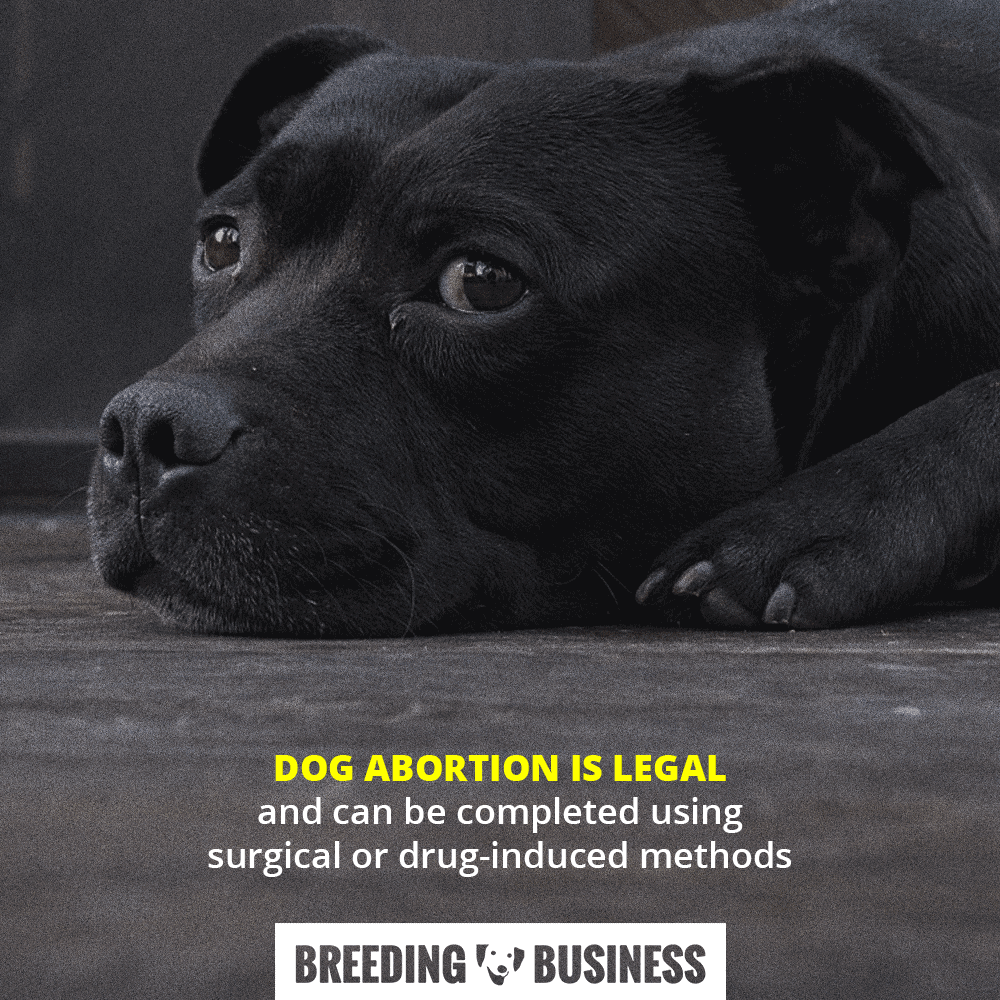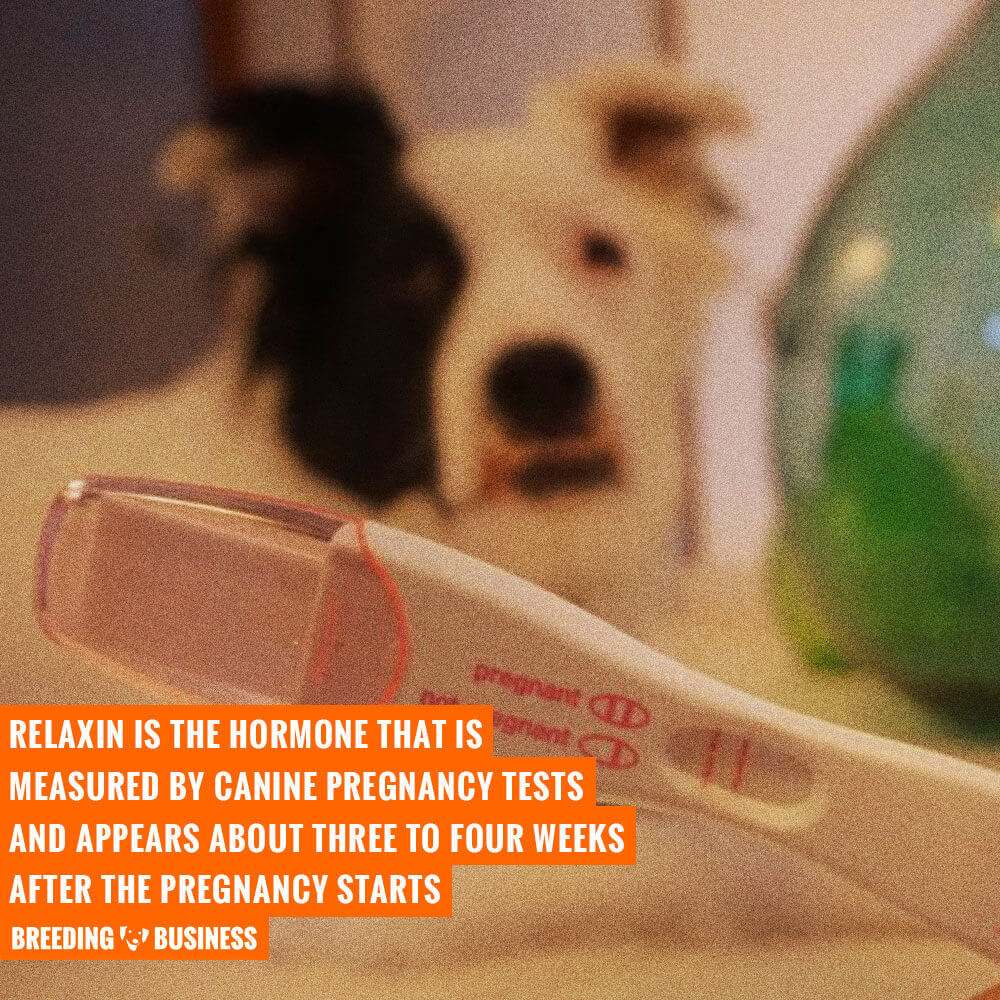Unwanted dog pregnancy refers to an accidental or undesired pregnancy in an unspayed female dog that was not meant to happen.
When female dogs are in heat, they secrete pheromones that attract male dogs in the vicinity. Male dogs follow the scent and find the female to mate with. If you’re not vigilant during her heat, you could end up with a hybrid or multi-sired litter.
Symptoms of an Unwanted Pregnancy
The signs of pregnancy in dogs are very subtle and only come to head when it’s either too late or too dangerous to abort. You must be alert if you see the following signs.
Weight around the abdomen
Female dogs do bloat a little right after the estrus—the phase of their menstrual cycle in which they bleed. It could trigger false pregnancy alarms, but still, take her to the vet if you suspect that the abdomen looks a little heavier than usual.
Enlarged mammary glands
A sure fire sign of pregnancy in a female dog is the gradual engorgement of the mammary glands. The milk-producing glands even change in color.
Engorged mammary glands mean the female dog’s body is getting ready for nursing the future litter of puppies. This is triggered by pregnancy hormones and therefore show that the pregnancy is well on its way.
Decreased appetite and activity
Appetite will decrease and excitement for walks will slowly vanish. Her body is heavier, her internals are going through changes, and all of this is tiring to say the least.
If you find your otherwise active pooch lazing in a corner or refusing her favorite food, chances are that she is pregnant. Most pregnant female dogs will go through mood swings and periodic lethargy.
Vomiting
Yes, dogs have morning sickness too! Vomiting in pregnant dogs is gradual and may start as very exceptional occurrences.
Over time, vomiting will become more frequent and timings may seem odd. While in the normal days, vomiting occurred post-meals, it now may happen first thing in the morning. Or right before bed.
Prevention of Unwanted Pregnancies in Dogs
Preventing unwanted dog pregnancies is much easier and safer than having to terminate them later. Terminating a pregnancy can cause emotional, physical, and mental distress for the dog and can have long-term effects on her health.
It is legal to terminate a dog’s pregnancy, and it can be done through a surgical spay or a drug-induced procedure, depending on the stage of pregnancy.

Here’s how you can prevent an undesired and unintended dog pregnancy.
Spaying & Neutering
Spaying refers to an operative surgery that sterilizes female dogs. Neutering refers to the operative surgery that sterilizes male dogs.
With females, it involves removing the fallopian tube, both the ovaries and the uterus. Spaying is a crucial surgery but your precious female will bounce back to normal within two weeks. Once the stitches come out, she’ll be even better than she was before.
Sterilizing dogs has many benefits. If you’re not intending to mate your dog ever—it really is the best thing you can do for her. It reduces the chances of a lot of illnesses and infections in your dog. Not only that, but you’ll also have peace of mind, knowing that she won’t attract any male dogs to mate.
Female dogs never go into menopause. So spaying them will save you a lifetime of discharge and odors while keeping her happy and safe as well. But above all, spaying is a safer and painless solution as opposed to aborting an unwanted dog pregnancy.
Enclosures and Kennels
Dog enclosures, pet playpens, and kennels are the second best and safest ways to prevent an unwanted dog pregnancy. Choose these if you are not looking at sterilizing your dog and are maybe looking at having a litter in the future.
A female dog goes into heat every 6-8 months, depending on her cycle. If you’re not looking to breed her during a particular cycle, keep her confined indoors. Either put your dog in an enclosure or kennel or keep her inside the house. Although the latter option can be a tad uncomfortable since dogs in heat can be somewhat messy.
Some companies make special pet containment units for dogs in heat. But the regular ones work just fine too. You need to have an area where other dogs can’t enter at all. Keep the enclosure on a concrete or tiled surface so that it is easier to clean and harder for male dogs to dig into. Seal it against trespassing by other dogs, in every possible way.
Panties and Diapers
Fail-proof, cheap, and clean—panties and diapers for dogs in heat are great when you have to keep your dog indoors. The period or the heat in a dog lasts for about 3 weeks. So these work great and prevent blood drips for messing up your carpet.
Dog diapers not only contain the discharge, but they also curb a lot of the odor, which minimizes the scent for dogs in the vicinity. Even if the male dogs come looking for her, you can keep put your dog indoors until the end of her estrus. And rest assured, thanks to these sanitary pads or diapers for dogs, you won’t be cleaning up after her.
Termination
Usually, a dog’s pregnancy should be terminated within 45 days of gestation. After this, it can be very dangerous for the dog’s mental and physical health. Trying to abort a dog pregnancy after the stipulated time frame results in the birth of dead puppies, which can be very traumatizing for the mother.
To ensure that the abortion takes place in time, look out for telltale signs like enlargement of nipples, weight around the abdomen, and morning sickness. Get a scan done from a vet to be sure.
Having said that, terminating an unwanted pregnancy in dogs is just as painful and traumatic for the female dog as it is for humans. It can take its toll emotionally and mentally and leave her in distress. Whether it lasts for a few days or months, it depends on the dog.
Ethically, it is just as controversial, if not more (because you’re literally deciding for the dog), to terminate a fetus. So try and prevent it at first.
We know that accidents do happen, so here are some known methods to induce abortion in pregnant dogs. These require you to know of a female dog’s pregnancy as soon as possible.

Oral Estrogens
These are not recommended for dogs and should be your absolute last case option. Oral estrogens are the “morning-after pill” for dogs and are not the preferred choice for carrying out a healthy abortion.
Estrogens are known to cause diseases and infections like pyometra or infected uterus. This can turn fatal before you know it. They are also ineffective if not administered at the right time. So you’re putting your dog’s life at risk for nothing.
Mismate injection and Misalliance Treatment
A drug called Alizin is injected into the neck. Two injections need to be administered 24 hours apart. In order to terminate an unwanted dog pregnancy. This is called Mismate or Misalliance treatment, referring to mating that should not have taken place.
The drug blocks the progesterone receptors in a dog’s uterus, subsequently disabling the uterus to maintain the pregnancy. This causes an abortion. It is highly effective when given within 22 days of gestation.
Speak to your vet before giving your dog this injection and responsibly supervise your pet after administering the treatment. You can expect discomfort and side effects for some time after the treatment, and if it persists, you must seek medical help.
Injectable Estrogens
Injectable estrogens are a lot safer, compared to the oral ones. The only catch is that they must be administered to the dog shortly after mating.
Injectable estrogen is the best solution when you catch the dogs in action or right after the copulation has taken place. That is when they’re most effective in preventing pregnancy. They also allow the female dog to get pregnant later on if you do wish to breed them responsibly.
Here-below are the two most used injectable hormones.
Prostaglandin F2 Alpha
With minimal to mild side effects and high success rates, Prostaglandin F2 Alpha is a preferred drug to abort dog pregnancies. It’s a completely natural hormone and is safe to use. However, a trained professional must administer it to the dog and the animal must be kept under observance.
Usual side effects include trembling, nausea, and diarrhea, sometimes panting and shortness of breath may also occur. A vet must be present to keep these under control.
The hormone is known to cause luteolysis, which induces termination of pregnancy in dogs and other animals. It is also known to cause contractions, thus resulting in abortion.
Dexamethasone
Dexamethasone is an immunosuppressant steroid, which is used in both humans and animals to treat a lot of disorders. In dogs, this drug is prescribed for diseases of the eyes and skin.
Administering dexamethasone under strict medical supervision can result in non-complicated and relatively painless abortions in dogs. Depending on how the animal reacts, the fetus is either eliminated or absorbed by the dog’s body.
Some of the side effects of taking dexamethasone to abort dog fetuses are mild to severe, but these side effects are really rare and hardly fatal. Some dogs may experience vaginal discharge and anorexia too.
The drug should be injected into the dog’s system within a few days of copulation, even better still if it is administered within a few hours.
Dopamine Agonists
Dopamine agonists work in terminating dog pregnancies by suppressing the production of prolactin—a hormone that is crucial for maintaining pregnancy. Quelling prolactin directly results in decreased progesterone, thereby aborting the pregnancy in dogs.
The reason this is a popular method of terminating unwanted pregnancy in dogs is that it is a safe and effective method, with little to no side effects. The major side effects of taking this drug are a loss of appetite and nausea in dogs.
The good thing about dopamine agonists is that they need to be administered after 25 days of gestation, giving enough time to think the abortion over and for the pregnancy signs to show.
Epostane
This drug works by not letting the body produce progesterone. The lack of progesterone automatically terminates the pregnancy within seven days.
No side effects have been reported post administering epostane, making it a fail-safe and fool-proof method to abort dog pregnancies.
Unwanted Canine Pregnancies – FAQ
Unwanted canine pregnancies are a massive source of worries in most dog owners, and even breeders. While most dog owners never go through one, it can be taken as a disaster when it happens to your female dog.
Here are some common questions answered about unwanted dog pregnancies!

Until when do you have, to terminate an unwanted pregnancy?
Unwanted pregnancies should usually be terminated within 45 days of gestation.
The signs of pregnancy will begin to show in your dog within a few days—look out for physical and behavioral symptoms. If you’re in doubt of whether your dog is pregnant or not, a simple scan will determine it.
Fetal signs of pregnancy in dogs can show up only after 25 days of gestation in the scan, after which you have about a week to decide what you want to do.
Typically, abortion and termination of pregnancies in dogs through medicines requires a week’s worth of medication. So be on the safe side and determine your dog’s pregnancy early in the day.
Can you abort a pregnant dog at home?
Aborting your dog at home isn’t safe and is definitely not advised. Always involve your vet in the process and conduct the termination of the pregnancy under careful supervision.
While home remedies may work, they can have also a plethora of side effects, which can harm your dog. Instead, opt for safe and medically approved methods to terminate your dog’s unwanted pregnancy.
The termination procedure usually lasts for a week to ten days, during the course of which also, you need to keep your pet under a vet’s keen eye. So conducting a home procedure without any supervision is nothing less than dangerous and careless.
What are the risks of stopping an unwanted pregnancy?
A lot of the risks depend on how, when, and in what manner are you aborting the pregnancy in your dog.
When done with the help of safe drugs, under a veterinary doctor’s guidance and supervision, and within 25-30 days of gestation, the abortion poses little to no risks.
Side effects of certain drugs may range from nausea to loss of appetite and lethargy. Sometimes, dogs may also show symptoms like vaginal discharge, bleeding, and behavioral changes.
Most drugs will render a dog capable of procreating in the future, but sometimes when the pregnancy is terminated at a later stage, the dog may give birth to dead puppies. This can affect her emotionally. This can affect children in your household, too.
If proper care isn’t taken, after the abortion, the dog will be prone to uterine infections.
Is there a morning after pill for dogs?
Yes, there are certain pills that work as morning-after pills for dogs. These are administered within a few hours of copulation.
Morning-after pills for dogs are extremely ineffective and are known to cause serious infections in dogs. Most commonly, they cause pyometra or infection of the uterus. These infections, if not taken care of, can turn fatal.
